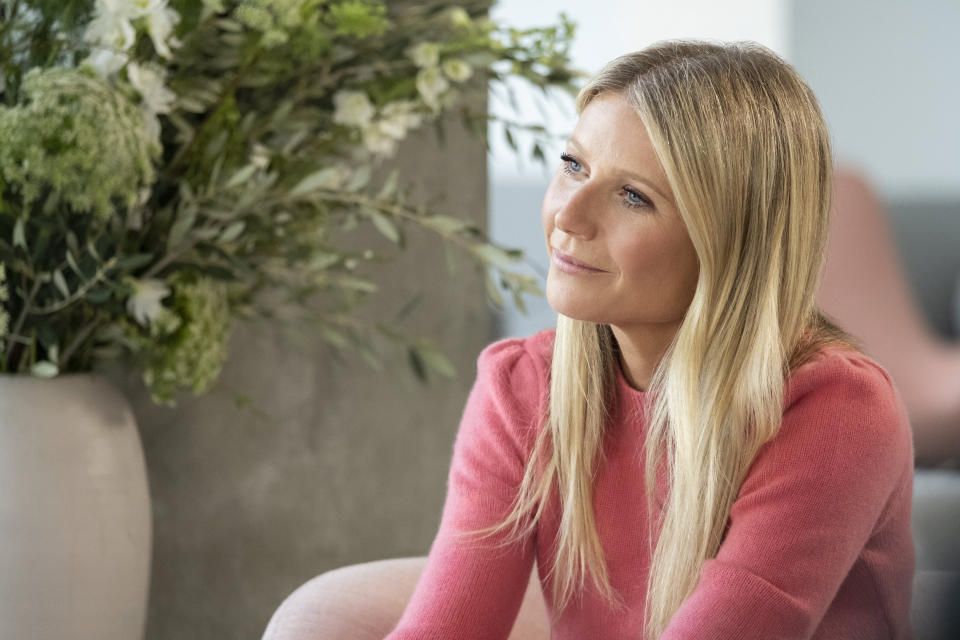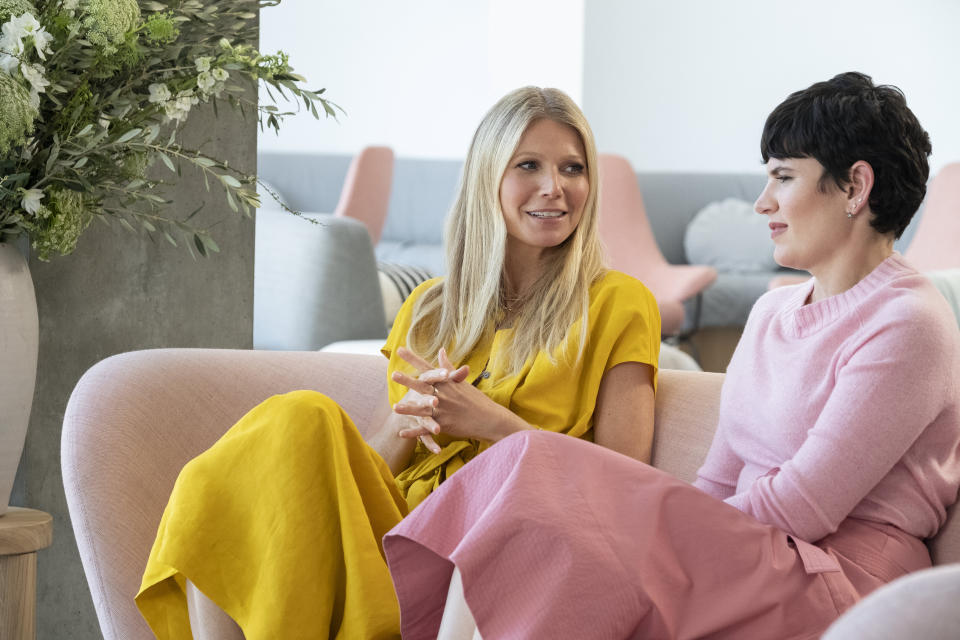'The Goop Lab’ Promotes 'Wellness' Obsession — And Goop Itself

I expected to have a strong reaction to “The Goop Lab,” the Netflix companion show to actress-turned-wellness-enthusiast Gwyneth Paltrow’s e-commerce brand Goop. After all, Goop is what made “yoni eggs” famous. Instead, I was mostly bored.
I watched the show’s first season in quick succession: six half-hour episodes full of muted neutrals, beautiful women with perfectly clear skin, Paltrow’s melodic-bordering-on-monotone speech patterns, and, of course, “wellness.” Each episode follows a group of Goop staffers as they try out a wellness trend or train with a practitioner, intercut with Paltrow and Goop Chief Content Officer Elise Loehnen sitting on a pale pink couch in a mostly white room chatting with the practitioner and another expert, often someone with a medical degree.
In some ways, “The Goop Lab” fits perfectly within the Netflix world of reality-TV offerings. Netflix has perfected the subgenre of hypnotic but slightly muted reality television ― “Tidying Up With Marie Kondo,” “Terrace House” and “Dating Around” all come to mind. But this is Goop.
Gwyneth Paltrow welcomes you to The Goop Lab on January 24 pic.twitter.com/ZzeEEbAy9L
— See What's Next (@seewhatsnext) January 6, 2020
Goop is best known for its dubious pseudoscientific claims and the now-infamous Jade Egg, which led to a 2018 lawsuit against the company for making “unsubstantiated marketing claims.” (The site claimed that the jade egg and rose quartz egg, once inserted into the vagina, could “balance hormones, regulate menstrual cycles, prevent uterine prolapse, and increase bladder control.” The civil penalties against the company also targeted the claim that an “Inner Judge Flower Essence Blend” could prevent depression.) But “The Goop Lab” is fairly benign, likely a product of both Netflix’s legal department and Goop’s desire to rehabilitate its quacky image.
Each episode begins with a disclaimer: “The following series is designed to entertain and inform ― not provide medical advice. You should always consult your doctor when it comes to your personal health or before you start any treatment.” This is about the extent to which skepticism of the show’s subsequent claims is expressed.
Viewers then watch as Goop staffers venture off in search of personal wellness. They travel to Jamaica and take mushrooms in a therapeutic setting. They try breathing techniques developed by extreme athlete Wim Hof that he claims are a natural way to “suppress immune response” and allow the body to withstand extreme cold. (One staffer tells the camera that she hasn’t had a panic attack since her time with Hof.) They try new diets, including an extreme fast-mimicking cleanse, and nonfiller facial treatments to “extend longevity,” which is just a fancier way of saying “look young.” They get energy work alongside dancer and actress Julianne Hough, which looks eerily similar to an exorcism. They learn how to ask for what makes them feel good in bed and look at a diversity of vulvas with sex educator Betty Dodson. They explore intuition and clairvoyance with psychic and medium Laura Lynne Jackson.

There are many tears, many airy, neutral-colored outfits, and many assurances that just because you can’t prove something, doesn’t mean it’s not real.
Overall, the themes of “The Goop Lab” are fairly basic. Anyone who has had access to a copy of “Our Bodies, Ourselves” has seen a vulva, energy healing techniques like reiki are nearly as mainstream as yoga, and much has been written about microdosing as an experimental means of treating post-traumatic stress disorder.
But, as BuzzFeed’s Scaachi Koul points out, “the trouble comes when you compare the series with Goop’s broader branding and strategy. Paltrow and her staff have built a business on pseudoscience that targets women where our anxieties are ... which leads people to buy products that don’t work or take advice that’s downright dangerous.”
Goop taps into a desperation for, as Dr. Will Siu puts it in “The Goop Lab’s” first episode, “something else to help us heal.”

There is something particularly striking about the show coming out during a week in which the impeached president of the United States is on trial; a perfect microcosm of the punishing news cycle we’ve all found ourselves in over the past four years. There is always a temptation to just disconnect from it all ― and at times, we need to. Goop plays into this desire by offering a worldview governed by the individual, pushing the idea that our anxieties and traumas are all under our control.
To an extent, this can be a healthy attitude, and taking control over your mental and physical health can be incredibly empowering. But “The Goop Lab” ethos stresses individual change without really tackling the structural inequalities that can lead to that anxiety and trauma, and prevent access to healing tools. Plus, there are simply some stressors that are real and external, and cannot be fixed by calming your nervous system with a breathing exercise.
Stressed about your nation’s crumbling democracy? Worried about rising hate crimes? Overwhelmed by climate change? Let’s put all that aside and think about how we can decrease our “biological age” in contrast to our chronological one. (Never mind that being “biologically” 2.5 years younger won’t mean anything if the planet ceases to exist.)
Love HuffPost? Become a founding member of HuffPost Plus today.

At the end of the day, “The Goop Lab” exists primarily to educate viewers about the Goop brand. It is essentially an extended, soothing infomercial for Paltrow’s lifestyle empire, each piece of said empire working symbiotically to promote the others and the seductive idea that all you need to get the most out of life is to learn a new breathing technique, take a cold shower, eat more fish, and perhaps buy a product or 12.
On Friday morning, I headed over to goop.com, which is promoting the show that promotes the site’s products. The new Goop Lab Shop sells a fast-mimicking diet Paltrow tried for $249 ― a hefty price for an intentional lack of food. It also has “special edition merch ... designed to celebrate” the show: six simple white T-shirts. You can purchase each one for $55.
Related...
Gwyneth Paltrow Brings Bad Health Advice To Netflix With 'The Goop Lab'
Food Isn't Medicine. Here's Why It's Dangerous To Believe It Is.
Gwyneth Paltrow Speaks Out On 'Smells Like My Vagina' Candle Uproar
This article originally appeared on HuffPost.

